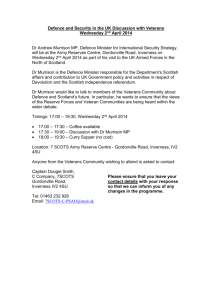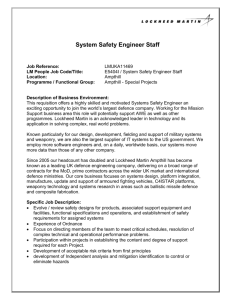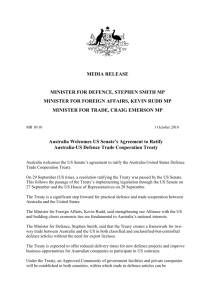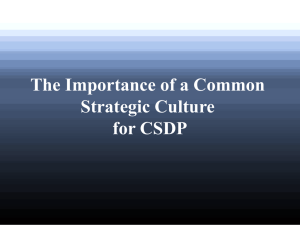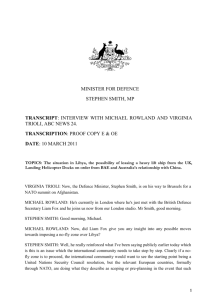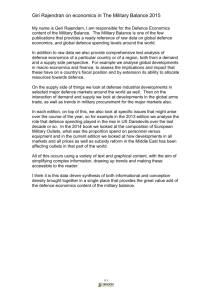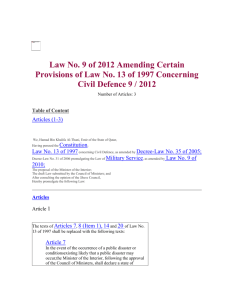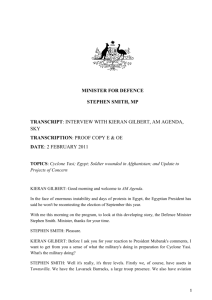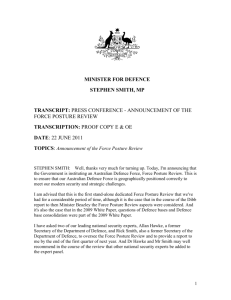Media Monitors Transcript
advertisement
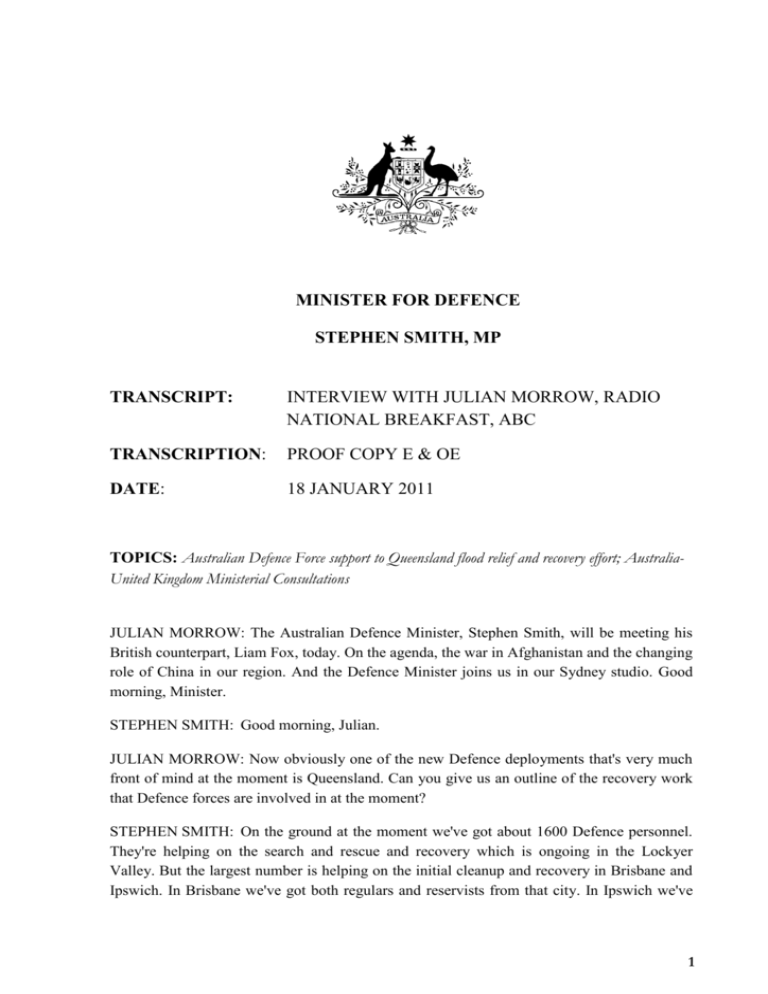
MINISTER FOR DEFENCE STEPHEN SMITH, MP TRANSCRIPT: INTERVIEW WITH JULIAN MORROW, RADIO NATIONAL BREAKFAST, ABC TRANSCRIPTION: PROOF COPY E & OE DATE: 18 JANUARY 2011 TOPICS: Australian Defence Force support to Queensland flood relief and recovery effort; AustraliaUnited Kingdom Ministerial Consultations JULIAN MORROW: The Australian Defence Minister, Stephen Smith, will be meeting his British counterpart, Liam Fox, today. On the agenda, the war in Afghanistan and the changing role of China in our region. And the Defence Minister joins us in our Sydney studio. Good morning, Minister. STEPHEN SMITH: Good morning, Julian. JULIAN MORROW: Now obviously one of the new Defence deployments that's very much front of mind at the moment is Queensland. Can you give us an outline of the recovery work that Defence forces are involved in at the moment? STEPHEN SMITH: On the ground at the moment we've got about 1600 Defence personnel. They're helping on the search and rescue and recovery which is ongoing in the Lockyer Valley. But the largest number is helping on the initial cleanup and recovery in Brisbane and Ipswich. In Brisbane we've got both regulars and reservists from that city. In Ipswich we've 1 got people from RAAF Amberley air base down the road, and we continue to have people using the helicopters to help in search and rescue but also transporting essential items and supplies. We expect in the course of this week that the numbers will drop to 1200 because we're going through a transition now. The search and rescue and recovery is focussed in the Lockyer Valley, Grantham and the like. So over the course of the next few days or week, we expect we'll get down to about 1200. But we're very pleased with the great work that the Defence personnel, both regulars and reservists, have been doing. It's been a terrific effort and we're very pleased with their work and proud of what they've been doing. JULIAN MORROW: What sort of strains does an operation like this put on the capacity of the armed forces, and how does it affect other deployments when the armed forces are doing, you know, work as a cleanup squad? STEPHEN SMITH: We've been very careful to make sure that whatever commitments we make don't do two things. Firstly, don't cut across the primary responsibility for disaster relief and management in Australia, which is civilian and, in the first instance, led by the state authorities. And so in Queensland, it’s an emergency management arrangement, its emergency services personnel, they are responsible for the work that occurs. Because of the scale of the operation in Queensland, we were asked to assist, and given that this is the biggest natural disaster we've seen since Cyclone Tracy, that was appropriate. But we complement and add to that which the state provides. The Australian Defence Force has a very good record of helping on disaster relief and disaster management, whether in Australia or in our region. And the most recent example would be the Victorian bushfires. But the second thing we have to be conscious of is not to cut into our core capacity to do what you'd regard as our core business, which, of course, is defence and operations. So at the moment everyone sees our operation in Afghanistan, the difficult and dangerous work we're doing there, but we've also got peacekeeping commitments in our own region, in East Timor and the Solomon Islands. We have also had for a number of years a peacekeeping contribution that we're making in Sudan. So we have to be careful not to overstretch and we have to be careful to ensure that whatever commitment we make for disaster relief or disaster relief management doesn't cut into our core capacity to do our other work. We're very confident of that and so are the Service Chiefs and the Chief of the Defence Force. 2 JULIAN MORROW: Okay. Well, let's move on to the talks that you're having today. You're meeting today with the UK's Defence Minister, Liam Fox, and you've said you'll be discussing changing dynamics in Asia. Are you concerned by China's military build-up? STEPHEN SMITH: What's occurring in Sydney today is what we call AUKMIN, AustraliaUnited Kingdom Ministerial Consultations. So it's the Foreign Minister, Mr Rudd, and I meeting with our respective counterparts, Foreign Secretary Hague and Defence Secretary Fox. It's the third so-called AUKMIN Meeting but the first one we've had in Australia. So we welcome that very much. We will be looking at the range of things that we share in terms of issues - Afghanistan and Pakistan - but also changing dynamics in the Asia-Pacific. We know this is the century of the Asia-Pacific with the movement of economic and political and strategic and military influence to that part of the world. JULIAN MORROW: And central to that also is the increased role of China. Is that something you'll be discussing? STEPHEN SMITH: Absolutely. It's not just the rise of China; it's also the rise of India and the rise of the ASEAN economies combined. JULIAN MORROW: Of course. STEPHEN SMITH: But when it comes to China's military expansion, we, Australia, acknowledge and accept, and the international community acknowledges and accepts, that as a country rises in terms of its economic prowess, there will also be a corresponding rise in its military capacity and capability. And what we say to China publicly and privately is that we simply want China to be transparent about its military and strategic intentions JULIAN MORROW: So will you and the UK be exchanging information about what you assess as the real scope of China's military build-up, because it's certainly suggested that Australia believes that the real situation is more than double what China's admitted. STEPHEN SMITH: We say to China publicly and privately we want them to be transparent about their military strategic intentions. That's the first thing. Secondly, we are also confident and positive about China emerging as what we would describe as a responsible stakeholder, a rising power that wants to take its part in the regional and international community and do so in accordance with accepted international norms. So yes, we will have a conversation about China but it won't be an exclusive conversation about China. Part of the dynamic in this century is the move of political and economic and strategic influence to the Asia-Pacific. That's our part of the world and it's one of the reasons 3 why Foreign Secretary Hague and Defence Secretary Fox are coming to Australia, coming to the Asia-Pacific, because they understand and acknowledge that as well. JULIAN MORROW: And that is probably where we'll have to leave it, Defence Minister Stephen Smith. Thanks very much for joining us on Radio National Summer Breakfast this morning. STEPHEN SMITH: Thank you. Thanks very much, Julian. JULIAN MORROW: And what a change of tone it is to be asking serious questions of the Defence Minister. I think the only questions I've asked Stephen Smith in the past have been Trivial Pursuit questions. But the Minister was always very kind to include those on the official transcripts of his press conferences. 4

